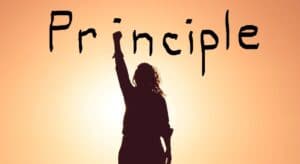Limited Government
The federal government should do what others cannot. Topics that fit these constitutional categories for federal involvement:
- Roads/bridges/technology/energy/public spaces (“infrastructure”)
- Health research and guidance (“disease prevention and control”)
- National defense
- Preserve and steward the Earth and make it a better place (“environment”)
- Protecting the vulnerable
- Interrelate with other nations (“foreign relations”)
- Make and enforce laws on matters of national importance
- National monetary policy and currency
- Ensure the future
Detailed sources and principles
Constitutional basis for limited federal government
Preamble to the U.S. Constitution: “We the People of the United States, in Order to form a more perfect Union, establish Justice, insure domestic Tranquility, provide for the common defense, promote general Welfare, and secure the Blessings of Liberty to ourselves and our Posterity, do ordain and establish this Constitution for the United States of America.”
Preamble to U.S. Constitution: “That to secure these rights, Governments are instituted among Men, deriving their just powers from the consent of the governed….”
10th Amendment to the U.S. Constitution: “The powers not delegated to the United States by the Constitution, nor prohibited by it to the States, are reserved to the States respectively or to the people.”
Biblical support for the role of civil government
“Let every person be subject to the governing authorities. For there is no authority except from God, and those that exist have been instituted by God…” Romans 13:1.
“Pay to all what is owed to them: taxes to whom taxes are owed, revenue to whom revenue is owed, respect to whom respect is owed, honor to whom honor is owed.” Romans 13:7.
This role includes stewardship over the environment. “Then God said, ‘Let us make man in our own image, after our likeness. And let them have dominion over the fish of the sea and over the birds of the heavens and over the livestock and over all the earth and over every creeping thing that creeps on the earth.’ So God created man in his image, in the image of God he created him; male and female he created them.” Genesis 1:26-27. “The Lord God took the man and put him in the garden of Eden to work it and keep it.” Genesis 2:15.
This role also includes stewardship over the nation’s finances and natural resources.
Freedom & Free Enterprise
Liberty and freedom of the people and free markets should be purposes of government.
Detailed sources and principles
Founding documents as basis for liberty:
Declaration of Independence: “We hold these truths to be self-evident, that all men are created equal, that they are endowed by their Creator with certain inalienable Rights, that among these are Life, Liberty and the pursuit of Happiness.”
Biblical basis for freedom:
“For freedom Christ has set us free; stand firm therefore, and do not submit again to the yoke of slavery….For you were called to freedom, brothers. Only do not use your freedom as an opportunity for the flesh, but through love serve one another.” Galatians 5:1, 13.
Religious Freedom & Separation
Church and State should be separated, but all must be free to worship.
Detailed sources and principles
Biblical basis for the importance of religious freedom:
For many, religion is the most important thing in the world to them. We do not want any other religion forced upon us by the government, and we want freedom to worship God.
By the same reasoning, the government should not force any other American to worship the God we do. This is the “Golden Rule,” which nearly all religions follow. See, for example:
Christianity, Matthew 7:12 (“Do for others what you want them to do for you.”);
Luke 6:31 (“Treat others as you want them to treat you.”); Jewish, Tobit 4:15 (“Do to no one what you yourself dislike.”);
Islam, Kitab al-Kafi (“As you would have people do to you, do to them; and what you dislike to be done to you, don’t do to them.”);
Hindu, Brihaspati, Mahabharata 13.114.8 (“One should never do that to another which one regards as injurious to one’s own self. This in brief, is the rule of dharma.”);
Buddhism, Udanavarga 5:18 (“Hurt not others in way that you yourself would find hurtful.”);
See also Matthew 22:35-40 (The greatest commandment is “… you shall love the Lord your God with all your heart and with all your soul and with all your mind….And the second is like it: you shall love your neighbor as yourself.”).
Equality
Governments must treat all people equally and equitably.
Detailed sources and principles
Constitutional basis for equality:
Fourteenth Amendment: “No State shall…deny to any person within its jurisdiction the equal protection of the laws.”
Declaration of Independence: “We hold these truths to be self-evident, that all men [and women] are created equal, that they are endowed by their Creator with certain inalienable Rights, that among these are Life, Liberty and the pursuit of Happiness.”
Biblical basis for equality:
All humans are made in the image of God. Genesis 1:26-27. Religions including Judaism, Islam, Christianity, and others teach this.
“There is neither Jew nor Greek, there is neither slave nor free, there is no male and female, for you are all one in Christ Jesus.” Galatians 3:28. This means that divisions and attitudes of superiority and inferiority are abolished.
“How can you claim that you belong to the Lord Jesus Christ, the Lord of glory, if you show favoritism to rich people and look down on poor people? If a man comes … judging a man by his wealth shows that you are guided by wrong motives. Listen to me, dear brothers: God has chosen poor people to be rich in faith, and the Kingdom of God is theirs….” James 2:1-7.
Protecting the Vulnerable
A necessary role of the government is to protect those in true need.
Detailed sources and principles
Biblical basis for protecting the disadvantaged:
“’For I was hungry and you gave me food, I was thirsty and you gave me drink, I was a stranger and you welcomed me, I was naked and you clothed me, I was sick and you visited me, I was in prison and you came to me.’ Then the righteous will answer him, saying, ‘Lord, when did we see you hungry and feed you, or thirsty and give you drink? And when did we see you a stranger and welcome you, or naked and clothe you? And when did we see you sick or in prison and visit you?’ And the King will answer then, ‘Truly, I say to you, as you did it to one of the least of these my brothers, you did it to me.’”
“Then he will say to those on his left, ‘Depart from me, you cursed, into eternal fire prepared for the devil and his angels. For I was hungry and you gave me no food, I was thirsty and you gave me no drink, I was a stranger and you did not welcome me, naked and you did not clothe me, sick and in prison and you did not visit me.’ Then they will answer, saying, ‘Lord, when did we see you hungry or thirsty or a stranger or naked or sick or in prison, and did not minister to you?’ Then he will answer them, saying, ‘Truly, I say to you, as you did not do it to one of the least of these, you did not do it to me.’” Matthew 25: 35-45.
“‘A man was going down from Jerusalem to Jericho, and he fell among robbers, who stripped him and beat him and departed, leaving him half dead. Now by chance a priest was going down that road, and when he saw him he passed by on the other side. So likewise a Levite, when he came to the place and saw him, passed by on the other side. But a Samaritan, as he journeyed, came to where he was, and when he saw him, he had compassion. He went to him and bound up his wounds, pouring oil and wine. Then he set him on his own animal and brought him to an inn and took care of him. And the next day he took out two denarii and gave them to the innkeeper, saying, ‘Take care of him, and whatever more you spend, I will repay you when I come back.’ Which of these three, do you think, proved to be a neighbor to the man who fell among the robbers? He said, ‘The one who showed him mercy.’ And Jesus said to him, ‘You go, and do likewise.’” Luke 10:30-37.
“Yes indeed, it is good when you truly obey our Lord’s command, ‘You must love and help your neighbors just as much as you love and take care of yourself.’ But you are breaking this law of our Lord’s when you favor the rich and fawn over them; it is sin.” James 2:8-9.
Transparency
Telling the people the truth, openly, is the best way to govern.
Detailed sources and principles
Biblical basis for the truth:
“You shall know the truth and the truth will set you free.” John 8:32.
“You shall not bear false witness against your neighbor.” Exodus 20:16.
Common sense:
We believe that leaders should not withhold information because “if we tell the people what we are doing, they would be upset,” as that simply proves leadership is doing something it shouldn’t be doing.
Law & Justice
Upholding the law/Constitution justly is an essential governmental function.
Detailed sources and principles
Constitutional basis for upholding the law and the Constitution:
It is the President’s duty to “preserve, protect and defend the Constitution of the United States.” Constitution, Article 2, section 1.
The President “shall take Care that the Laws be faithfully executed.” Constitution Article 2, section 3.
Preamble to the U.S. Constitution: “We the People of the United States, in Order to form a more perfect Union, establish Justice, insure domestic Tranquility, provide for the common defense, promote general Welfare, and secure the Blessings of Liberty to ourselves and our Posterity, do ordain and establish this Constitution for the United States of America.”
Biblical basis for obedience to laws of governments:
“For rulers are not a terror to good conduct, but to bad. Would you have no fear of the one who is in authority? Then do what is good, and you will receive his approval, for he [the authority enforcing the law] is God’s servant for your good. But if you do wrong, be afraid, for he does not bear the sword in vain. For he is the servant of God, an avenger who carries out God’s wrath on the wrongdoer.” Romans 13:3-5.









